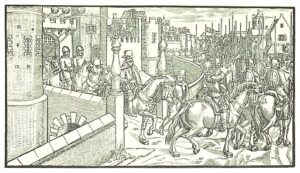Podcast: Elections in Ireland from Middle Ages to Penal Laws

Cathal Brennan and John Dorney discuss the origins of the Irish Parliament from its foundation in the medieval lordship through the early modern period. First broadcast on the Irish History Show.
The Irish Parliament dated back to the late 1200s, when the Lord Chief Justice of the Lordship of Ireland, first called an elected assembly of Anglo-Norman Lords, Bishops and Commoners. It was a colonial parliament and the native Gaelic Irish could not attend. Its purpose was to ratify new laws and new taxes required by the monarch.
It was in no sense the government of the country, which was constituted by the Lord Deputy, the representative of the King of England.
In the middle ages the parliament was a nearly annual event, but met only for a few days a year, in places as diverse as Drogheda, Kilkenny, Trim and Castledermot, as well as Dublin. Elections were usually arranged among the small number of voters beforhand and only rarely contested.
But some features remained constant from the 13th century up to the 1800s, including the electorate to the House of Commons, which was composed of the freemen of towns, landholders and 40 shilling freehold tenants. The constituencies were a chaotic, to our eyes, collection of counties, cities and ‘boroughs’. Women were not explicitly excluded and may have voted as property holders on occasion.
Elections were held only as the start of the reign of a new monarch. And interestingly parliaments, both in Ireland and England were called far less frequently as we enter the early modern period, from 1500 onwards.
We discuss how, from the 1540s, Gaelic Irish property holders were brought into the English system. But also how the Tudor conquest of Ireland and the concurrent Protestant reformation made election to the infrequently called paraliaments in the 15 and 1600s fraught with sectarian rancour, notably in the election of 1613.
In the 1650s Ireland was made subject of an act of union by the Cromwellian regime, in theory a parliamentary republic but in practice more of a military dicatatorship. The Commonwealth did hold elections twice, however, in 1654 and 1659 and Irish (all Protestant) voters sent 30 MPs to a London parliament.
We also talk about two occasions in which Irish Catholics attempted to form their own parliamentary regimes – the Confederate Catholic assembly of the 1640s and the Jacobite ‘Patriot Parliament’ of 1689.
The period under discussion ends with the all Protestant Parliament of 1692-99, which imposed the anti-Catholic legislation that we know as the Penal Laws.
We have started a Patreon page for The Irish Story website and The Irish History Show. Please consider subscribing if you want to support our work.